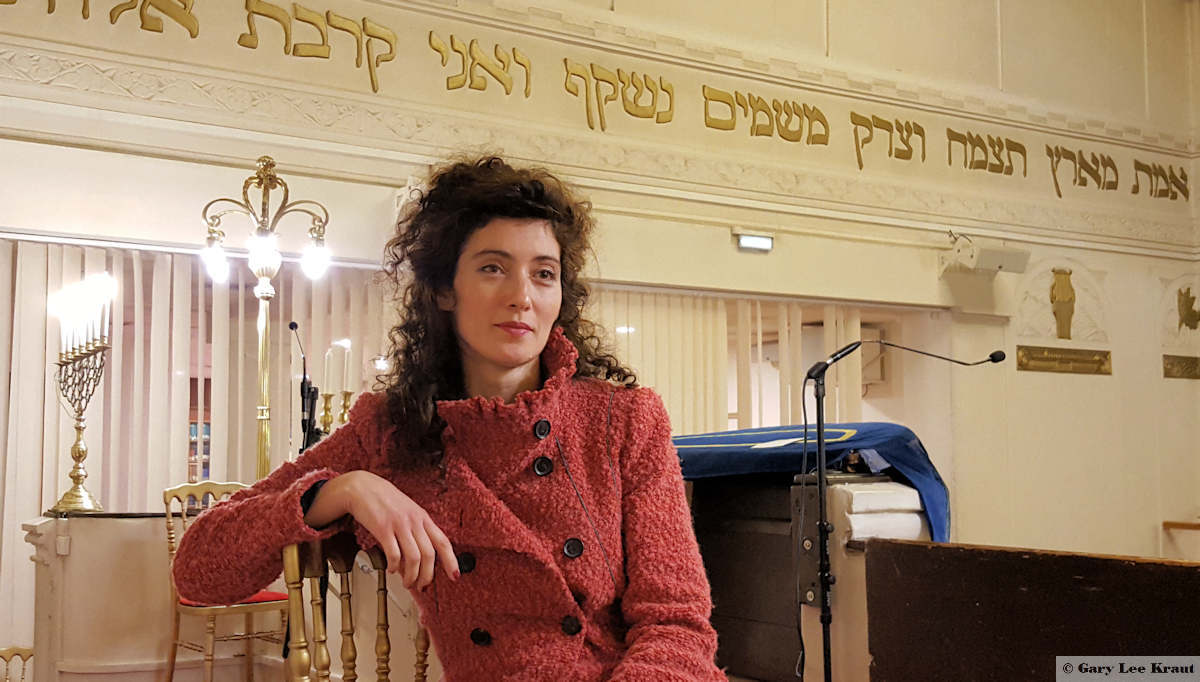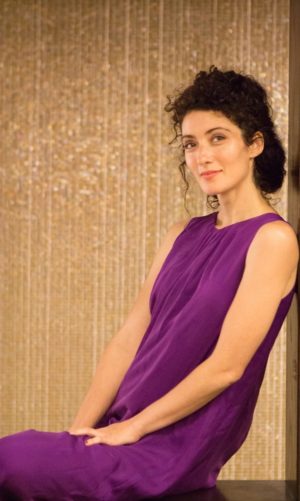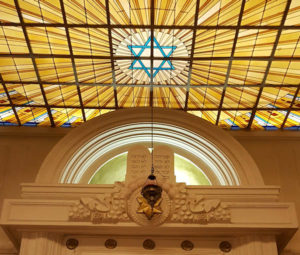
“People perceive me sometimes as an alien,” Sofia Falkovitch says of being the first—and currently only—female cantor in France. But that certainly isn’t how she perceives herself. “I feel that I’m a product of my time and of my generation,” she says, “where we have multiple identities and where we have the possibility to travel the world and to be able to connect people, to connect cultures and religions.”
Watch the video interview below to understand the dual nature of Sofia Falkovitch and her work, at once alien and fully connected. She speaks here of her childhood in the former Soviet Union, her decision to pursue cantorial studies in Berlin, the experience of leading a service in a predominately Orthodox synagogue in Germany, and her vision of music and song as a way of bringing people together, not only within the Jewish community but within broader society. She also speaks of her love of Paris as an exciting “platform where cultures and religions meet.”

The interview was filmed in the main sanctuary at the Copernic Synagogue in Paris’s 16th arrondissement. Home to the Union Libérale Israélite de France, Copernic is France’s oldest Liberal or Reform synagogue, dating to 1907. It is Falkovitch’s local synagogue since she is married to Rabbi Jonas Jacquelin, one of its religious leaders. (They have two children.) Falkovitch is not, however, the cantor at the Copernic Synagogue, nor is she permanently employed elsewhere. She has opted for an international career singing both liturgical music and classical works. Indeed, Falkovitch is also an accomplished concert mezzo-soprano who has performed in synagogues, churches, concert halls and theaters around the world.
For those unfamiliar with Judaism, the cantor or hazan is the synagogue official who sings liturgical music and leads the congregation in chanted prayer. The three main currents in Judaism, called Orthodox, Conservative and Reform in English, are called Orthodox, Massorti and Libéral in French. While Reform and Liberal may be used interchangeably, and in fact both are part of the overall movement of Progressive Judaism, individual synagogues and practices will vary due to cultural and community influences.
The equality of men and women is an essential value in the Progressive movement. Though Progressive Judaism is well established in the United States, it has been less prominent in Europe, and particularly in France, until recently.
Beyond the alluring color of her voice and the elegance of her presence, Sofia Falkovitch is an articulate representative of this current of Judaism while also carving her own path as a singer. Having grown up in Moscow, studied in Germany, Israel and Canada, and now living in Paris, her mastery of seven languages (French, English, Russian, German, Yiddish, Hebrew and Spanish) itself speaks volumes about her sense of the importance of communication among individuals, faiths and cultures.
Watch the interview here:
See Sofia Falkovitch’s website for further information about her work, upcoming concert dates and information about her latest CD, released in 2019, entitled “The Voice of Sacred Heritage,” in which she interprets psalms and sacred Hebrew music.
The Copernic Synagogue and Organized Jewish Life in Western Paris
The Copernic Synagogue is located at 24 rue Copernic in Paris’s 16th arrondissement. (Synagogues in Paris are commonly referred to by the name of the street on which they’re located.) Visitors interested in attending services or a concert at Copernic must contact the synagogue in advance. Services at Copernic are accompanied by an organist and a choir.
 The above interview took place in the synagogue’s Art Deco sanctuary built 1923-1924. Despite opposition from some in the community who have fought for the sanctuary’s preservation, the community’s board has elected to replace it with a new sanctuary as part of a future expansion of the synagogue complex. The project is currently in the fundraising phase. Questions of preservation aside, the planned expansion is a sign of the evolution of the infrastructure.
The above interview took place in the synagogue’s Art Deco sanctuary built 1923-1924. Despite opposition from some in the community who have fought for the sanctuary’s preservation, the community’s board has elected to replace it with a new sanctuary as part of a future expansion of the synagogue complex. The project is currently in the fundraising phase. Questions of preservation aside, the planned expansion is a sign of the evolution of the infrastructure.
In the same vein, on the far edge of the 17th arrondissement, Kehilat Gesher, a bilingual (French-English) Liberal community, is about to move into its new synagogue at 11 avenue de la Porte de Champerret. American-born Rabbi Tom Cohen is the driving force behind that community. He’s married to Pauline Bebe, France’s first female rabbi. See the article A Couple of Rabbis in Paris.
The 17th arrondissement and its neighboring suburbs have increasingly become a hub of Jewish activity of various mainstream currents, both in residential and organizational terms. In October 2019 the European Jewish Center was inaugurated in this same district by President Emmanuel Macron.
Bei Mir Bistu Shein
Let’s end with two minutes of Yiddiskeit at the Copernic Synagogue. In the video below, The Moscow Male Jewish Cappella, led by its founder and artistic director Alexander Tsaliuk, performs Bei Mir Bistu Shein (בײַ מיר ביסטו שיין; To Me You’re Beautiful).
© 2020, Gary Lee Kraut

